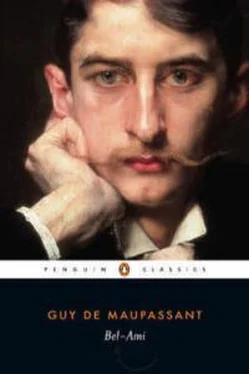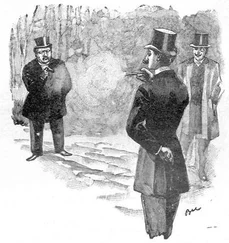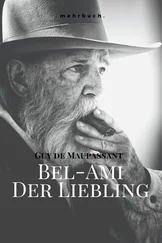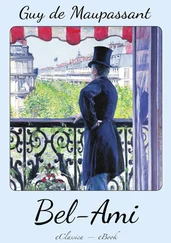"Listen to me, my dear friend; I have already reflected upon what you proposed to me, and I cannot allow you to depart without a word of reply. I will, however, say neither yes nor no. We will wait, we will see; we will become better acquainted. You must think it well over too. Do not yield to an impulse. I mention this to you before even poor Charles is buried, because it is necessary, after what you have said to me, that you should know me as I am, in order not to cherish the hope you expressed to me any longer, if you are not a man who can understand and bear with me."
"Now listen carefully: Marriage, to me, is not a chain but an association. I must be free, entirely unfettered, in all my actions—my coming and my going; I can tolerate neither control, jealousy, nor criticism as to my conduct. I pledge my word, however, never to compromise the name of the man I marry, nor to render him ridiculous in the eyes of the world. But that man must promise to look upon me as an equal, an ally, and not as an inferior, or as an obedient, submissive wife. My ideas, I know, are not like those of other people, but I shall never change them. Do not answer me, it would be useless. We shall meet again and talk it all over later. Now take a walk; I shall return to him. Good–bye until to–night."
He kissed her hand and left her without having uttered a word. That night they met at dinner; directly after the meal they sought their rooms, worn out with fatigue.
Charles Forestier was buried the next day in the cemetery at Cannes without any pomp, and Georges returned to Paris by the express which left at one–thirty. Mme. Forestier accompanied him to the station. They walked up and down the platform awaiting the hour of departure and conversing on indifferent subjects.
The train arrived, the journalist took his seat; a porter cried: "Marseilles, Lyons, Paris! All aboard!" The locomotive whistled and the train moved slowly out of the station.
The young man leaned out of the carriage, and looked at the youthful widow standing on the platform gazing after him. Just as she was disappearing from his sight, he threw her a kiss, which she returned with a more discreet wave of her hand.
Georges Duroy resumed his old habits. Installed in the cozy apartments on Rue de Constantinople, his relations with Mme. de Marelle became quite conjugal.
Mme. Forestier had not returned; she lingered at Cannes. He, however, received a letter from her announcing her return about the middle of April, but containing not a word as to their parting. He waited. He was resolved to employ every means to marry her if she seemed to hesitate; he had faith in his good fortune, in that power of attraction which he felt within him—a power so irresistible that all women yielded to it.
At length a short note admonished him that the decisive moment had arrived.
"I am in Paris. Come to see me."
"Madeleine Forestier."
Nothing more. He received it at nine o'clock. At three o'clock of the same day he called at her house. She extended both hands to him with a sweet smile, and they gazed into each other's eyes for several seconds, then she murmured:
"How kind of you to come!"
He replied: "I should have come, whensoever you bade me."
They sat down; she inquired about the Walters, his associates, and the newspaper.
"I miss that very much," said she. "I had become a journalist in spirit. I like the profession." She paused. He fancied he saw in her smile, in her voice, in her words, a kind of invitation, and although he had resolved not to hasten matters, he stammered:
"Well—why—why do you not resume—that profession—under—the name of Duroy?"
She became suddenly serious, and placing her hand on his arm, she said: "Do not let us speak of that yet."
Divining that she would accept him, he fell upon his knees, and passionately kissed her hands, saying:
"Thank you—thank you—how I love you."
She rose, she was very pale. Duroy kissed her brow. When she had disengaged herself from his embrace, she said gravely: "Listen, my friend, I have not yet fully decided; but my answer may be 'yes.' You must wait patiently, however, until I disclose the secret to you."
He promised and left her, his heart overflowing with joy. He worked steadily, spent little, tried to save some money that he might not be without a sou at the time of his marriage, and became as miserly as he had once been prodigal. Summer glided by; then autumn, and no one suspected the tie existing between Duroy and Mme. Forestier, for they seldom met in public.
One evening Madeleine said to him: "You have not yet told Mme. de Marelle our plans?"
"No, my dear; as you wished them kept secret, I have not mentioned them to a soul."
"Very well; there is plenty of time. I will tell the Walters."
She turned away her head and continued: "If you wish, we can be married the beginning of May."
"I obey you in all things joyfully."
"The tenth of May, which falls on Saturday, would please me, for it is my birthday."
"Very well, the tenth of May."
"Your parents live near Rouen, do they not?"
"Yes, near Rouen, at Canteleu."
"I am very anxious to see them!"
He hesitated, perplexed: "But—they are—" Then he added more firmly: "My dear, they are plain, country people, innkeepers, who strained every nerve to give me an education. I am not ashamed of them, but their—simplicity—their rusticity might annoy you."
She smiled sweetly. "No, I will love them very much. We will visit them; I wish to. I, too, am the child of humble parents—but I lost mine—I have no one in the world"—she held out her hand to him—"but you."
He was affected, conquered as he had never been by any woman.
"I have been thinking of something," said she, "but it is difficult to explain."
He asked: "What is it?"
"It is this: I am like all women. I have my—my weaknesses. I should like to bear a noble name. Can you not on the occasion of our marriage change your name somewhat?" She blushed as if she had proposed something indelicate.
He replied simply: "I have often thought of it, but it does not seem easy to me."
"Why not?"
He laughed. "Because I am afraid I should be ridiculed."
She shrugged her shoulders. "Not at all—not at all. Everyone does it, and no one laughs. Separate your name in this way: Du Roy. It sounds very well."
He replied: "No, that will not do; it is too common a proceeding. I have thought of assuming the name of my native place, first as a literary pseudonym and then as my surname in conjunction with Duroy, which might later on, as you proposed, be separated."
She asked: "Is your native place Canteleu?"
"Yes."
"I do not like the termination. Could we not modify it?"
She took a pen and wrote down the names in order to study them. Suddenly she cried: "Now I have it," and held toward him a sheet of paper on which was written: "Mme. Duroy de Cantel."
Gravely he replied: "Yes, it is very nice."
She was delighted, and repeated: "Duroy de Cantel. Mme. Duroy de Cantel. It is excellent, excellent!"
Then she added with an air of conviction: "You will see how easily it will be accepted by everyone! After to–morrow, sign your articles 'D. de Cantel,' and your 'Echoes' simply 'Duroy.' That is done on the press every day and no one will be surprised to see you take a nom de plume. What is your father's name?"
"Alexandre."
She murmured "Alexandre!" two or three times in succession; then she wrote upon a blank sheet:
"M. and Mme. Alexandre du Roy de Cantel announce the marriage of their son, M. Georges du Roy de Cantel with Mme. Forestier."
She examined her writing, and, charmed with the effect, exclaimed: "With a little method one can succeed in anything."
Читать дальше











